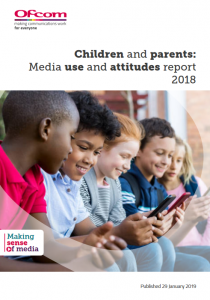
After more than 40 years of operation, DTVE is closing its doors and our website will no longer be updated daily. Thank you for all of your support.
Ofcom: TV ‘of lessening importance’ as kids spend more time online
Children in the UK aged five to 15 now spend around 20 minutes more online, in a typical day, than they do in front of a TV set, according to Ofcom research.
 The UK broadcast regulator’s annual study on children’s media use noted that while TV sets are still used by almost all children, TV viewing on the TV set “appears to be of lessening importance”.
The UK broadcast regulator’s annual study on children’s media use noted that while TV sets are still used by almost all children, TV viewing on the TV set “appears to be of lessening importance”.
Children’s online time was estimated at an average of 2 hours and 11 minutes per day, roughly the same as in 2017, while daily TV time fell year-on-year by almost eight minutes to approximately 1 hour 52 minutes per day.
YouTube remained children’s primary online destination. Asked if they prefer to watch YouTube videos or programmes on a TV set, 49% of both 8-11 year-olds and 12-15 year-olds opted for YouTube. Just 14% of 8-11s and 16% of 12-15s said they prefer TV.
“Following a substantial increase in use between 2016 and 2017, use of YouTube is comparable to last year and increases with age, with close to half of 3-4s (45%) ever having used it, rising to 89% of 12-15s,” said the report.
Live TV viewing was found to be increasingly limited to ‘appointment-to-view’ programmes, such as live sport or popular shows like Love Island. Live viewing was also often convened by parents so that the family to come together to watch soaps, quizzes or entertainment shows like Strictly Come Dancing.
Ofcom claims that YouTube is “increasingly seen as the viewing platform of choice, particularly among 8-11s,” with vloggers, how-to videos, unboxing videos and game tutorials all growing in popularity year-on-year.
Some 52% of 12-15 year-olds said they watch vloggers or YouTube personalities, with many claiming they look up to their favourite vloggers as role models or regard them as friends who could provide support or advice.

On the OTT front, 32% of 3-4 year-olds and 49% of 5-15s said they use services like Netflix, Amazon Prime Video and Now TV.
“This research sheds light on the challenge for UK broadcasters in competing for kids’ attention. But it’s clear that children today still value original TV programmes that reflect their lives, and those primetime TV moments which remain integral to family life,” said Yih-Choung Teh, strategy and research group director at Ofcom.
The research was based on data collected from 1,430 interviews with parents of 5-15s and children aged 8-15, along with 630 interviews with parents of children aged 3-4.
To access Ofcom’s full ‘Children and parents: Media use and attitudes report 2018,’ click here.

